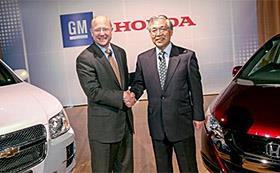Automakers promise shared technology by 2020, follow similar hydrogen partnerships involving Toyota, Ford and Nissan.
 General Motors and Honda will share new technology for hydrogen-powered cars as automakers race to make the alternative fuel viable for average drivers.
General Motors and Honda will share new technology for hydrogen-powered cars as automakers race to make the alternative fuel viable for average drivers.The joint agreement comes six months after BMW and Toyota first said they would work together to sell a hydrogen-powered car by 2020. At that same time in January, Ford, Daimler and Renault-Nissan announced a similar partnership to sell a hydrogen-powered car by 2017.
In New York, GM Vice Chairman Steve Girsky (above left) and Honda North America president Tetsuo Iwamura said they would prepare new fuel cells and hydrogen storage systems by 2020. However, the two automakers appear to be on separate product paths. In 2015, Honda plans to sell a new version of the FCX Clarity, which has been on sale in Japan since 2002 and in Southern California since 2008. General Motors said it did not have a timeline yet for its own hydrogen-powered vehicle.
Honda is leasing about 200 hydrogen-powered FCX Clarity models in Southern California, where most of the nation's 56 hydrogen refueling stations are located. General Motors ran a fleet of 119 hydrogen-powered Equinox vehicles during a customer trial from 2007 to 2010 and claims more real-world mileage testing (nearly 3 million) than any other automaker.
Mercedes-Benz, owned by Daimler, is leasing a few dozen hydrogen models in California that are based on the B-Class subcompact sold in Europe. Audi recently opened a solar-powered hydrogen gas plant in Germany, which it will use for future models running on both hydrogen and natural gas. Like Honda, Toyota also plans to sell its first hydrogen-powered car in 2015, and Renault has tested a hydrogen-powered crossover, the Scenic ZEV H2, since 2008. In May, Aston Martin raced a hydrogen-gasoline hybrid at the 24 Hours of Nürburgring in Germany in May.
Hydrogen-powered cars, also known as fuel-cell vehicles, run on electricity produced by a chemical reaction thatsplits hydrogen atoms into charged protons and electrons using oxygen and a metal catalyst. Hydrogen is stored in gaseous form at high pressure in heavy metal tanks like those used on natural gas-powered cars and then fed to a conventional electric motor like with traditional EVs. Refueling is similar to gasoline-powered cars in that it takes just a few minutes at a pump station. The only exhaust is water vapor.
Just one year ago, hydrogen was on the back burner as battery-powered electric cars and plug-in hybrids stole the show, fueled by billions in government loans to automakers and tax credits to new buyers.
In May, Hyundai signed up with the U.S. Energy Department's H2USA program, which relies heavily on investment by private companies to promote the technology. Toyota, Nissan and Mercedes-Benz are also on board. Federal funding for hydrogen development has languished, with just $80 million earmarked for the Department of Energy in 2013, down from $103.6 million in 2012. Hydrogen tax credits of up to $4,000 for vehicle owners and larger credits for owners of refueling stations are both set to expire in 2014.
While hydrogen promises an emissions-free future, producing the gas in considerable, sustainable quantities remains a challenge. Problems with large-scale production (requiring lots of energy) and storage (compressed tanks requiring too much space) have not been solved to the point where the cars and the fuel itself can sell at affordable prices.
autos.msn.com
No comments:
Post a Comment